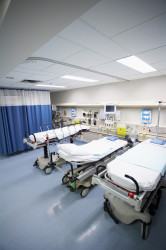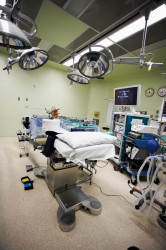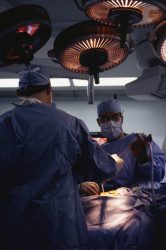|
|
|---|
| an emergency vehicle that transports sick or injured people to a hospital |
| the accident and emergency department of a hospital |
|
|
| a room in a hospital used for performing surgery (originally designed for operations in front of observers) |
| a surgical procedure performed by a doctor |
| to perform some manual act upon a human body in a methodical manner, and usually with instruments, with a view to restore soundness or health, as in amputation, lithotomy, etc. |
| |
| |
| the cessation of life and all associated processes; the end of an organism's existence as an entity independent from its environment and its return to an inert, nonliving state |
| |
| the state that follows birth, and precedes death |
| |
| |
imgserver-66-200248743
-
ambulance, ambulances(noun)
-
- an emergency vehicle that transports sick or injured people to a hospital
-
- Call the ambulance, he is having a heart attack!
imgserver-66-87811581
-
casualty, casualties[ˈkaʒ(ʊ)əlti](noun)
-
- the accident and emergency department of a hospital
-
- The injured man was brought to casualty.
-
-
-
- He needs to have surgery because his blind gut is inflamed.
imgserver-66-87547575
-
operating theatre, operating theatres(noun)
-
- a room in a hospital used for performing surgery (originally designed for operations in front of observers)
-
- The nurse brought the man into the operation theatre.
-
imgserver-66-76801653
-
operation, operations[ˌɒpə(ɹ)ˈeɪʃən](noun)
-
- a surgical procedure performed by a doctor
-
- She had an operation to remove her appendix.
imgserver-66-200245905
-
-
- to perform some manual act upon a human body in a methodical manner, and usually with instruments, with a view to restore soundness or health, as in amputation, lithotomy, etc.
-
- It's the first time that the young doctor is allowed to operate.
-
-
-
- His grandfather died a few years ago.
-
-
-
-
- All of my grandparents are dead.
-
-
death[dɛθ](uncountable noun)
-
- the cessation of life and all associated processes; the end of an organism's existence as an entity independent from its environment and its return to an inert, nonliving state
-
- The death of my grandmother saddened the whole family.
-
-
-
- She didn't want to look at her grandmother's corpse.
-
-
- the state that follows birth, and precedes death
-
- My friends are a very important part of my life.
-
-
-
-
- He's not expected to live for more than a few months.
-
-
-
- He did not survive the accident.
Enter the correct word in the text box and then confirm your entry. If you make a mistake, the word will be repeated automatically! Learn with pictures and examples by customizing the vocabulary trainer to fit your needs.
Keyboard shortcuts: Enter: Check / Go to next question | Alt+1: Hint | Alt+2: Solution
Complete the word by entering the missing letters!
| ambulance |
| casualty |
| operation |
| operate |
| die |
| dead |
| death |
| corpse |
| life |
| live |
| survive |
Click on the two cards that belong together!
Word and Image
Tries: 0ambulance | |
operate | |
operating theatre | |
casualty | |
operation | |
Word and Definition
Tries: 0die | to stop living |
corpse | a dead body |
casualty | the accident and emergency department of a hospital |
ambulance | an emergency vehicle that transports sick or injured people to a hospital |
dead | no longer living |
survive | to continue to live |
live | to have life |
death | the cessation of life and all associated processes; the end of an organism's existence as an entity independent from its environment and its return to an inert, nonliving state |
operate | to perform some manual act upon a human body in a methodical manner, and usually with instruments, with a view to restore soundness or health, as in amputation, lithotomy, etc. |
operating theatre | a room in a hospital used for performing surgery (originally designed for operations in front of observers) |
operation | a surgical procedure performed by a doctor |
have surgery |
life | the state that follows birth, and precedes death |
Definition and Image
Tries: 0 | a room in a hospital used for performing surgery (originally designed for operations in front of observers) |
| an emergency vehicle that transports sick or injured people to a hospital |
| to perform some manual act upon a human body in a methodical manner, and usually with instruments, with a view to restore soundness or health, as in amputation, lithotomy, etc. |
| the accident and emergency department of a hospital |
| a surgical procedure performed by a doctor |












